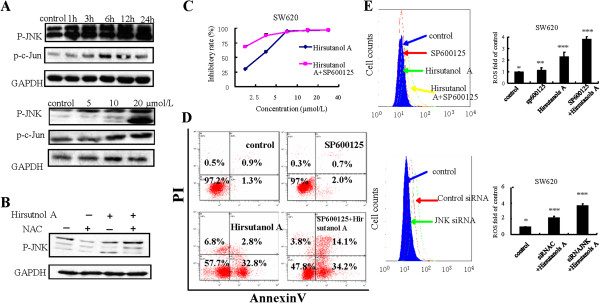Figure 6.
Hirsutanol A activated JNK signaling pathway through elevating of ROS production and blockage of JNK signal pathway increased apoptosis and elevated ROS level induced by hirsutanol A. SW620 cells were treated with 20 μmol/L hirsutanol A for indicated times or various concentrations of hirsutanol A for 24 h. The expression of p-JNK and p-c-Jun were detected by immunoblotting assay (A). SW620 cells were pre-incubated with NAC for 1 h, then treated with 20 μmol/L hirsutanol A for 24 h. The expression of p-JNK was determined by immunoblotting assay (B). SW620 cells were pre-incubated with SP600125 for 1 h , then treated with 20 μmol/L hirsutanol A for 72 h. Cell growth inhibition were detected by MTT assay (C). SW620 cells were pre-incubated with SP600125 for 1 h , then treated with 20 μmol/L hirsutanol A for 48 h. Cell apoptosis was detected by AnnexinV/PI analysis (D). SW620 cells were pre-incubated with SP600125 for 1 h or transfected with JNK- siRNA to block JNK signaling pathway, then treated with 20 μmol/L hirsutanol A for 3 h. Cellular ROS level was monitored by flow cytometry. Results are presented as means ± SD from 3 independent experiments. (** < 0.05 versus *; *** < 0.01 versus *) (E).

